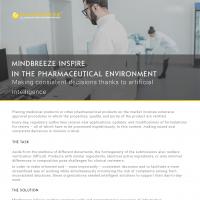Research, technology, and innovation: Success depends on the data
Our world is changing at an ever-increasing pace, new technologies are impacting our lives, and the competition never sleeps. Consequently, a company’s research and development department plays a central role in ensuring the continued viability of the business. That’s where most development and innovation is rooted – be it in the development of innovative components for an aircraft or car manufacturer, the quest for new drugs, or in accelerating the approval process for a pharmaceutical company.
A closer look at the research expenditure of the top 50 pharmaceutical companies in terms of revenue highlights just how enormous the sums invested in this area are. As a result, the pharmaceutical and biopharmaceutical industry is one of the most research-intensive sectors. Lengthy and expensive development periods for new active ingredients necessitate a substantial amount of research. In 2017, the combined R&D expenditures of the leading pharmaceutical companies amounted to over USD 160 billion.
In view of these immense costs, any delay – let alone refusal – to grant authorization for the active substance would prove disastrous. To counter this, it stands to reason that companies endeavor to provide the required documents in the best possible way – a difficult undertaking, especially when it involves large amounts of documentation. That’s why many companies have come to rely on the support of AI-based knowledge management solutions.
Insight engines for AI-based knowledge management
Insight engines unite the best of both worlds – conventional enterprise search functionality (search – find) combined with methods based on artificial intelligence such as natural language processing and natural language understanding (understanding the content and the query in natural language). That means that information can be made available in the right context regardless of where it is stored. To this end, Mindbreeze InSpire indexes the data from the available data sources, analyzes it, and then merges it in the form of an index. For queries, the insight engine displays the relevant information in a clearly arranged 360-degree view on a personal dashboard, offering an enormous advantage when information about an active substance or project needs to be made available quickly to support decision-making.
Making consistent decisions based on artificial intelligence
When it comes to placing drugs or other pharmaceutical products on the market, making well-founded and consistent decisions is particularly business critical. In the course of extensive approval procedures, regulatory and approval authorities are responsible for examining the nature, quality, and purity of the product, both for new applications, updates, and changes in formulations, as well as for processing incoming submissions swiftly.
Discover how our insight engine supports the day-to-day work for staff at a regulatory agency in the pharmaceutical sector in the case study Mindbreeze InSpire in the pharmaceutical environment:
Open Case Study
Interested? We’re looking forward to your inquiry.
Incidentally, alongside the research and development department, insight engines also provide support to employees from other corporate divisions.
Latest Blogs
Winning Proposals with Generative AI: Automate RFP Content and Curation
In the digital landscape that dominates all facets of business, companies rely on efficient, accurate knowledge base management to streamline processes and deliver critical information to customers and employees alike.
AI-Powered Contract Management: Minimizing Risks and Meeting Compliance Standards
Today’s fast-paced digital environment calls for contract managers to be laser-focused on speed. However, increasing speed cannot come at the cost of accuracy, making scaling much more complex and demanding.


